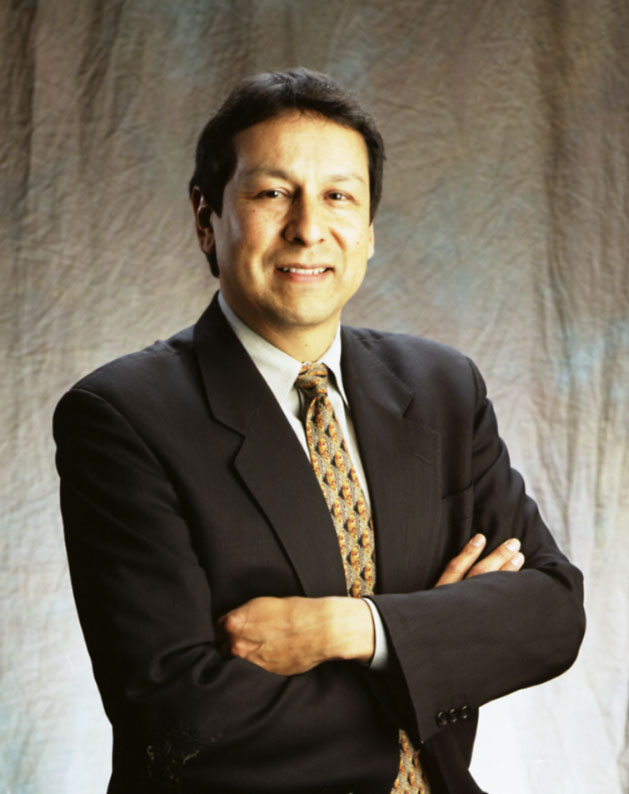
Speaker Bio – Michael A. Mata
Micahel A. Mata
Michael A. Mata has designed and administered community and faith-based programs for over 30 years, particularly in the areas of community development, congregational redevelopment, intercultural programs, organizational and leadership development, ministry/nonprofit management and community youth development. Recently appointed to direct the Los Angeles Program in Masters in Transformational Urban Leadership at Azusa Pacific Seminary he is also the Community Transformation Specialist with Compassion Creates Change, Inc. and an affiliated faculty at Fuller Theological Seminary. Prior to his current assignments he was the Urban Development Director for World Vision U.S. Program where he was responsible for guiding the department’s implementation of its Signature Programs Model (community transformation focused on community youth development). Mata was the Mildred M. Hutchinson Assistant Professor of Urban Ministry (the first endowed chair in urban ministry) and Director of the Urban Leadership Institute at the Claremont School of Theology (1993-2003). As an ordained minister, he served fifteen years as part of the pastoral team at Los Angeles First Church of the Nazarene (a multi-ethnic/multi-congregation church with a highly regarded community program and prominent youth program) and two years as Pastor of Urban Mission at Pasadena First Church of the Nazarene. He is also the former Director of the Bresee Institute (a key resource for faith-based community and leadership development efforts, which gained distinction among the academic, business and political leaders of Los Angeles under his leadership).
Mata’s vast experience and knowledge of community and faith-based community development makes him a much-sought-after instructor, speaker, and consultant. Former clients include such organizations as the Los Angeles United Methodist Urban Foundation, the National Crime Prevention Council, Esperanza USA, the Hudson Institute, Presbytery of the Pacific, National Campaign to Prevent Teen Pregnancy, World Vision U.S. Field Operations, Plowshares Institute, Long Beach District of the United Methodist Church. Southern California Association for Philanthropy, the U.S. Department of Housing and Urban Development (Center for Faith-based and Community Initiatives) and Urban Strategies, LLC.
He serves and has served as adjunct faculty at various schools and seminaries, such as, Drew Seminary, Mennonite Brethren Biblical Seminary, Nazarene Theological Seminary, Prairie Graduate School, and Southern Nazarene University.
Mata serves or has served on the boards and advisory councils of local and national community, ecumenical, nonprofit and academic organizations such as the Latino Coalition for Community and Faith-based Initiatives, Korean Churches for Community Development (KCCD) and the Association for Urban Theological Education and Ministry (AUTEM). He has also been a member of the Koreatown/Wilshire Center Community Advisory Committee for Revitalization and the Planning Commission of the City of Berkeley.
His skills and expertise have garnered him great recognition in the community as a consummate networker and crafter of coalitions, particularly among community and religious groups that are inexperienced in political and civic affairs.
- Most recently he was an advisor to the RAND Corporation’s research and intervention project on Urban Congregations and HIV/AIDS.
- He was appointed to serve on the “Blue Ribbon” County Commission to End Homelessness in Los Angeles (2003-2006).
- He was honorary co-chair of the 2003 conference of the Seminary Consortium of Urban Pastoral Education, having served as chair of its 25th anniversary conference in 2001.
- He was very involved in the rebuilding efforts after the 1992 Los Angeles civil unrest, helping to organize the African-American, Latino and Korean evangelical leadership.
- He was one of the primary initiators and the first convener of the Consortium of Urban Leadership Development Programs (COULD), a 100-member network of individuals and organizations in Los Angeles concerned with capacity building for urban community development. This network became the Southern California Urban Theological Education Partnership (SCUTEP),
- He has served with Call to Renewal (affiliated with Sojourners), Board of Directors of World Vision, U.S., West Angeles Community Development Corporation (affiliated with the 25,000-member West Angeles Church of God in Christ), John M. Perkins Foundation for Reconciliation and Development, Jimmy Carter Los Angeles Habitat for Humanity Work Project, Affordable Housing Services (a non-profit organization integrating social services and low-income housing development), JobStarts, Inc., Los Angeles Housing Loan Fund, P.F. Bresee Foundation (a multi-service agency), Communities for a Better Environment, Servant Partners, the Regional Advisory Board for the Hispanic Association of Bilingual/Bicultural Ministries (HABBM), Christian leaders Empowering for Reconciliation with Justice (CERJ), the National Advisory Panel of the Faith-Based Community Development Program of the National Congress for Community and Economic Development (NCCED), Pew-funded Advisory Boards of the Faith and Service Technical Education Network (FASTEN) and the Roundtable on Religion and Social Welfare Policy at the Rockefeller Institute of Government.
- He currently serves on the Latino Community Council for SoCal PBS; Al Wooten Jr. Heritage Center, the Vesper Society and the QueensCare Charitable Foundation.
Michael has been engaged as the principal investigator in several research projects over the past few years, including exploring the effect of community service on congregational life (the United Methodist Shalom Effort in Southern California), “best practices” of vital congregations in changing communities (Presbyterian Urban Ministry Planning Group Study), the community-serving role of Hispanic Protestant congregations (a Pew-funded project), the role of religion in the lives of Latino families (a literature review supported by the Annie E. Casey Foundation), the role of religious organizations in the production of affordable housing in Southern California (funded by the Fannie Mae Foundation). He has completed a probe of the religious ecology of two neighborhoods for the Los Angeles Urban Funders’ Capacity and Community Building Initiative.
He co-authored and co-edited with Ray Bakke et. al. the innovative (for its time) internet book, “Transforming the City: From Dream to Reality” (version 1.0, 1994; version 2.0, 1998):
www.interaccess.com/users/telchar/theocity.html
He published in the international forum cityvoices (sic): “Educating Clergy and Laity Together for Transformative Ministry” (Spring 1998); in the national Hispanic publication SHOUT, “A Community Development Approach to Youth Ministry” (Summer 1998); in New World Outlook: “Hispanic Churches in Three Urban Communities” (January/February 2000); “A Reading of the Urban Text: Challenges and Possibilities of Diversity for Pastoral Care” in the Journal for the Society of Intercultural Pastoral Care and Counseling (August, 2000); and a chapter in Reframing Urban Theological Education entitled “The Challenge of Contextualized Education,” (Jossey-Bass Publishers, 2000).
As part of his work with RAND several articles have been published: “An intervention to reduce HIV-related stigma in partnership with African American and Latino churches” in AIDS Education and Prevention 2014; 26(1): 28–42, et. al., “Facilitators and Barriers to HIV Activities in Religious Congregations: Perspectives of Clergy and Laity Leaders from a Diverse Urban Sample.” Journal of Religion and Health (August 2013), et. al. “Religious Congregations’ Collaborations: With Whom Do They Work and What Resources Do They Share in Addressing HIV and Other Health Issues?” Health Education & Behavior (vol 39 No 6, December 2012), et. al. “Religious Congregations’ Involvement in HIV: A Case Study Approach” in AIDS and Behavior (17 0ctober, 2010), et. al., “Religious congregations’ involvement in HIV: A case study approach” in AIDS Behavior 2011 Aug;15(6):1220-32, et. al., “Learning about Urban Congregations and HIV/AIDS: Community-Based Foundations for Developing Congregational Health Interventions” in the Journal of Urban Health,(2010) vol 87, no.4, 617-630, et.al.
He is a member of various regional, national and international associations such as the American Planning Association, Hispanic Association for Theological Education, and the Association for Urban Theological Education and Ministry. Mata is the recipient of many community and academic honors and awards, including numerous accolades from the City Council and State Legislature for his community service. He was awarded the 2004 Urban Shepherd Award by the Los Angeles Methodist Urban Foundation. PBS SoCal highlighted his work as a “Community Champion” in 2013 (http://video.pbssocal.org/video/2365069091/).
Rev. Mata holds the degree of Master in City Planning from the University of California at Berkeley as well as Master of Divinity and Master of Arts in Religion, respectively, from Nazarene Theological Seminary and Point Loma Nazarene University. His Bachelor of Art in Biblical Literature with a minor in Business Administration is from Point Loma Nazarene University. He has completed doctoral studies at the School of Policy, Planning and Development at the University of Southern California.
